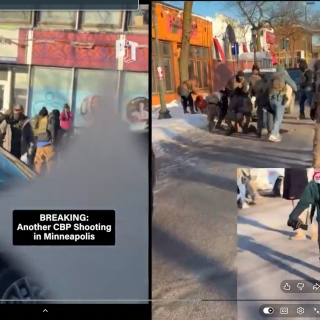The Columbus Coalition for Responsive Government (“the Coalition”) has announced that the Hot Times in Olde Towne Festival, September 6-8, will be the last event at which signatures will be collected for the Coalition’s campaign finance reform petition.
The Coalition has been collecting petition signatures in order to enact a campaign finance reform law, saying the high cost of elections in Columbus and the 28 year practice of making council appointments, rather than holding original elections, has eliminated meaningful competition for elected offices and reduced the responsiveness of elected officials to the citizens.
Willis Brown, a member of the Committee of Petitioners that is sponsoring the ordinance says, “the voters passed a charter amendment in 1994, authorizing city council to enact a campaign finance law. Twenty years later, the city council still has not passed a meaningful finance reform law, so we as citizens have written a law and as citizens are bringing it up to Council for consideration.”
Under the City Charter, which is the City’s constitution, Columbus residents have the right to propose legislation, which is typically the job of Columbus City Council. Brown adds, “we are doing what our elected officials have failed to do for the past 20 years, as they have consolidated their positions of power instead.”
Under the Charter, if the Coalition submits more than 9,700 valid signatures of registered voters, the proposed ordinance must be voted upon by City Council within a week. If the City Council votes “yes,” the citizen-initiated ordinance becomes law and goes into effect. If the Council votes “no,” the measure will be put on the ballot for a vote by the people at the next election (spring 2014). If the people then vote “yes,” the ordinance becomes law and can only be changed again by a vote of the people.
Joe Sommer, a member of the coalition says, “We as Democrats traditionally believe in more fair elections – elections where everybody can vote where money doesn’t buy influence. It has not been our practice to seek to disenfranchise voters or buy elections. That is why we have reacted so negatively to the Citizens United decision that allows unlimited PAC spending. I am hopeful that my fellow Democrats will stand up for our party’s values when it comes to this local finance reform.”
The Columbus Fair Campaigns Code Creates Voluntary Caps
The Coalition’s campaign finance reform is aptly named the Columbus Fair Campaigns Code. This code was crafted similarly to a campaign law in effect in the City of Austin, Texas. In short, it creates an opt-in campaign financing system, where candidates for Mayor and Member of City Council can agree sign contracts with the City in which those candidates commit to capping their contributions and expenditures. The contribution and spending limits for Mayoral races is $350,000, and for Council races $85,000. Candidates who do not sign these contracts are not considered “qualifying candidates,” and may raise and spend as much money as they want, but they do not get a set of publicly-provided election benefits.
In exchange for agreeing to these caps, qualifying candidates are given a set of public requirements and benefits designed to increase the level and depth of their communication with the voters at a lower cost. First, qualifying candidates are required to participate in a series of debates sponsored by the Columbus Community Relations Commission that must be broadcast on the City’s two publicly-owned cable television stations, CTV-3 and Channel 21.
Enhanced Flow of Information to Voters
The citizens’ legislation also allows candidates who have opted-in and agreed to the provisions of the Columbus Fair Campaigns Code, access to the publicly-owned cable television stations to broadcast campaign messages that they develop themselves to the public. The goal is to allow candidates the opportunity to explain their positions to the voters in a format beyond a 30-second sound bite.
“Voters need more than to see a 30-second commercial that says the candidates support police officers, fire fighters and good jobs. We deserve more and better information about the candidates, their experiences, and their views on the issues facing Columbus,” said Diann Thomas Beasley, a member of the Coalition. “By using our existing and publicly owned media infrastructure, we can allow candidates to engage in a dialogue with the public, rather than having our elections bought by the person who pays for the most sound bites. This benefits the taxpaying public, rather than the media ad salespeople and candidates who simply have more connections and more money.”
In addition to the public television access, all candidates must disclose in all their advertising whether or not they have agreed to the contribution and expenditure limits.
The Columbus Fair Campaigns Fund
A major provision of the law creates the Columbus Fair Campaigns Fund, a pool of money that would be split by candidates who have opted in to the campaign reform system. The fund is originally capitalized by a $300,000 transfer of the casino gross tax receipts received by the City of Columbus from the state of Ohio in each municipal election year (odd years). The casino tax receipts are the same pool of money being tapped by the City to pay for the Nationwide Arena bailout. “If we can use $236 million of those dollars to pay for a bailout of the wealthiest individuals and corporations in Central Ohio, we can certainly assign a small portion to finance fair campaigns for the benefit of the citizens,” says Doug Zimmerman, a Coalition supporter.
The fund would continue to increase beyond the $300,000 per election cycle, as contributors could make donations to the fund instead of to candidates, and excess contributions received by qualifying candidates could be directed to the fund.
Defines a Campaign Period for Fundraising
The proposed law also sets a campaign period that starts no later than the day a candidate files a Nominating Petition announcing his or her intent to run for office, and ends 30 days after the election. The Campaign Period is the only period of time in which any candidate may raise money for a Columbus election to Mayor or Council. The law also puts caps on the amount of money any candidate can keep in a Mayoral or Council campaign account outside of the election period.
Brown says “There is no reason, and no benefit, to the 365 day fundraising that builds huge war chests. That is done for the purposes of the politicians, not the purposes of the public. It is for building political empires, buying favors, and bullying potential candidates out of a future race. Perpetual fundraising is not for the good governance, administration, or benefit of Columbus citizens.”
Sugar Daddy Causes Concern
Campaign finance reports filed by candidates at the Franklin County Board of Elections show that in the 2011 City Council elections, Council President Andrew Ginther give over $108,000 to the three other incumbent council members on the ballot with him (Council Members Herschel Craig, Zach Klein, and Michelle Mills).
In a press statement, the Coalition said, “the idea that the Council President had appointed members Klein and Mills to the council within the previous year, and then provided the majority of financing for their elections, creates a credibility issue for those council members individually and for the Council as a whole. Citizens are left to wonder whether the council members are loyal to the voters, or to the Council President who appointed them and then turned around and poured money into their campaigns for election.”
Coalition member Bob Fitrakis says, “This type of legislation is what happens when the people are well-represented. In this case, we are representing ourselves and writing our own legislation. That is our right, and that is our responsibility when those we elect will not do it. The citizens of Columbus deserve fair elections. We do not deserve hand-picked appointees, who are then propped up by the appointer in their election as incumbents.”
Over the past 28 years, only 3 members have been elected to council, prior to the start of their service on council. All the rest -- including all 7 of the current council members -- have been appointed to Council first, and then face their first election with all the benefits of incumbency including a history of access to CTV-3, at least meager legislative accomplishments that are a byproduct of sitting in the seat, and the financial largess of the Council President who pays for most of their advertising.
Suzanne Patzer, one of the original petitioners who sponsored the Columbus Fair Campaigns Code, adds “This system is broken. The politicians won’t fix it, so we as citizens must. We urge you to come to Hot Times in Olde Towne, at the Columbus Public Health grounds on corner of Parsons Avenue and East Main Street, and add your name to the list of people who have signed our petitions for fair and competitive campaigns in Columbus,”



